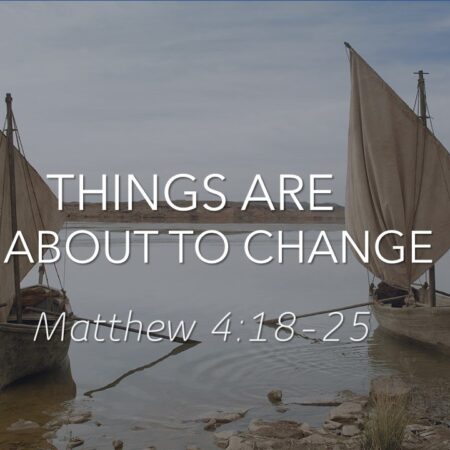John 13:33 Matthew 12:40-42 Luke 18:31-33 Genesis 2:24-25 Genesis 3:8-13 Romans 6:16 Luke 4:1-13 Luke 11:20 John 14:1-31
"R.T. France" Tagged Sermons
1 Peter 1:3-7 James 1:2-4 James 1:12-15 Matthew 4:1-11 “We are being guarded by God’s power THROUGH FAITH.” Os Guiness in his book “The Call” writes: “All truth in a fallen…
Dallas Willard in “The Divine Conspiracy”
Bar-Code Faith
Think of the bar codes now used on goods in most stores. The scanner responds only to the bar code. It makes no difference what is in the bottle or package that bears it, or whether the sticker is on the ‘right’ one or not. The calculator responds through its electronic eye to the bar code and totally disregards everything else. If the ice cream sticker is on the dog food, the dog food is ice cream, so far as the scanner knows or cares.
On a recent radio program a prominent minister spent fifteen minutes enforcing the point that ‘justification’, the forgiveness of sins, involves no change at all in the heart of personality of the one forgiven. It is, he insisted, something entirely external to you, located wholly in God himself.
His intent was to emphasize the familiar Protestant point that salvation is by God’s grace only and is totally independent of what we may do. But what he in fact said was that being a Christian has nothing to do with the kind of person you are. The implications of this teaching are stunning.
The theology of Christian trinkets says there is something about the Christian that works like the bar code. Some rituals, some belief, or some association with a group affects God the way the bar code affects the scanner. Perhaps there has occurred a moment of mental assent to a creed, or an association entered into with a church. God ‘scans’ it, and forgiveness floods forth. An appropriate amount of righteousness is shifted from Christ’s account to our account in the bank of heaven, and all our debts are paid. We are, accordingly, ‘saved’. Our guilt is erased. How could we not be Christians?
For some Christian groups the ‘account’ has to be appropriately serviced to keep the debts paid up, because we really are not perfect. For others – some strong Calvinist groups – every debt past, present and future is paid for at the initial scan. But the essential thing in either case is the forgiveness of sins. And the pay-off for having faith and being ‘scanned’ comes at death and after. Life now being lived has no necessary connection with being a Christian as long as the ‘bar code’ does its job.
R.T. France in his commentary gives us the answer:
“These large “crowds” are said to “follow” Jesus, the same term which in verses 20 and 22 denoted the first disciples’ total change of lifestyle….
A radical commitment to accompany Jesus.
Yet as the narrative progresses, we shall find only a few who are Jesus’ constant and committed companions, while a less easily defined “crowd” comes and goes. This wider group represents a pool of possible “full-time” recruits, but generally their “following” seems to be more sporadic and temporary.
The verb “follow” alone is not therefore a sufficient indication of full-scale discipleship. Mark 3:7-8 is perhaps more exact in describing this interprovincial crowd as simply “coming to” Jesus.”
Michael Heiser in “Supernatural” writes:
“The members of God’s family have a mission: to be God’s agents in restoring his good rule on earth and expanding the membership of his family. We are God’s means to propel the great reversal begun in Acts 2, the birth of the church, the body of Christ, until the time when the Lord returns.
As evil had spread like a contagion through humanity after the failure of the first Eden, so the gospel spreads like an antidote through the same infected host. We are CARRIERS of the truth about the God of gods, his love for all nations, and his unchanging desire to dwell with his family in the earthly home he has wanted since its creation. Eden will live again.
Everything we do and say matters, though we may never know why or how. But our job isn’t to see – it’s to do. Walking by faith isn’t passive – its purposeful.”
Carmen Joy Imes in her book “Bearing God’s Name” writes:
“Matthew’s gospel breaks neatly into five blocks of teaching, mimicking the five books of the Torah (Genesis, Exodus, Leviticus, Numbers, Deuteronomy).
These five blocks of teaching are preceded by an introductory story in which Jesus’ life is in danger because King Herod, like Pharaoh, is killing Jewish babies. To escape, his parents take him to Egypt. It’s an inside-out Exodus story. When the coast is clear, they return to Palestine, retracting Israel’s journey from Egypt to the promised land. Next, we fast forward to Jesus’ adulthood, where he passes through the waters of baptism in the Jordan, reminding us of Israel’s crossing both the Red Sea and the Jordan.
After this, Jesus is sent by the Spirit into the wilderness for forty days, where he reenacts Israel’s wilderness wanderings.”
Baptism does not produce salvation in this text, Rather, it corresponds to something that does, THE DEATH OF JESUS (v 19) and the RESURRECTION (v 21)
“Baptism saves” if one makes a decision; a pledge of loyalty oath,
a public proclamation of who is on the Lord’s side in the cosmic war between good and evil.
Every Baptism is therefore a reiteration of the past and future doom of the Watchers in the wake of the gospel and the kingdom of God.
Early Christians understood the typology of this passage and its link back to 1 Enoch and Genesis 6:1-4.
This is why early baptismal formulas included a renunciation of Satan and his angels. Baptism was anything but routine. It was a symbol of spiritual warfare.” Dr. Michael Heiser “Reversing Hermon”
Who is Azazel?
We find the Biblical text in Leviticus 16:7-10
“And Aaron shall take the two goats, and he shall present them before Yahweh at the tent of assembly’s entrance. Then Aaron shall cast lots for the two goats: one lot for Yahweh and one for Azazel. And Aaron shall present the goat on which the lot for Yahweh fell, and he shall sacrifice it as a sin offering. But the must present alive before Yahweh the goat on which the lot for Azazel fell to make atonement for himself, to send it away into the desert to Azazel.”
R.T. France
“His Father is testing him in the school of privation, and his triumphant rebuttal of the devil’s suggestions will ensure that the filial bond can survive in spite of the conflict that lies ahead.”
Dr. Michael Heiser in the “Unseen Realm” makes this comment about that temptation:
“Had Jesus given in, it would have been an acknowledgment that Satan’s permission was needed to possess the nations. It wasn’t. Satan presumed power and ownership of something that, ultimately, was not his but God’s. The messaging behind Jesus’ answer is clear: Yahweh will take the nations back by his own means in his own time. He doesn’t need them to be given away in a bargain. Jesus was loyal to his Father.”




